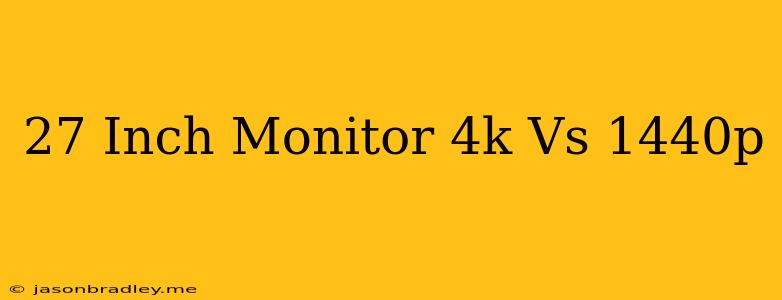27-inch 4K vs 1440p: Which Monitor is Right for You?
Choosing the right monitor can be a daunting task, especially with the abundance of options available. Two popular resolutions for 27-inch monitors are 4K (3840 x 2160 pixels) and 1440p (2560 x 1440 pixels). Both offer excellent visual quality, but each comes with its own set of advantages and disadvantages. To help you make an informed decision, let's delve deeper into the pros and cons of each resolution.
27-inch 4K Monitor:
Pros:
- Exceptional clarity and detail: 4K offers a significantly higher pixel density than 1440p, resulting in sharper text, images, and videos. This is especially noticeable when viewing content with intricate details, such as high-resolution photos or 4K movies.
- Immersive experience: The increased pixel density creates a more immersive experience, especially for gaming and video editing.
- Future-proof: 4K is becoming the standard for high-resolution content, making it a future-proof investment.
Cons:
- Higher price: 4K monitors generally cost more than 1440p monitors.
- Higher demands on your PC: 4K displays require more powerful graphics cards to run games and demanding applications smoothly.
- Smaller text: The higher pixel density can make text appear smaller, requiring you to adjust the display settings or use a larger font size.
27-inch 1440p Monitor:
Pros:
- More affordable: 1440p monitors are generally more budget-friendly than 4K monitors.
- Less demanding on your PC: 1440p displays require less processing power, making them a good choice for those with older or less powerful PCs.
- Larger text: The lower pixel density results in larger text, which can be more comfortable for reading and working on documents.
Cons:
- Less detail: 1440p displays lack the sharpness and detail of 4K monitors.
- Less immersive: The lower pixel density can lead to a less immersive experience, especially when viewing content in a large room or at a distance.
- May not be as future-proof: While 1440p is still a popular resolution, 4K is quickly becoming the dominant standard.
Making the Right Choice:
Ultimately, the best monitor for you depends on your individual needs and budget. Here are some key considerations:
- Budget: 4K monitors are more expensive than 1440p monitors. If you're on a tight budget, a 1440p monitor might be a better choice.
- PC performance: 4K displays require a powerful graphics card to deliver smooth performance. If your PC isn't up to the task, a 1440p monitor might be a more practical option.
- Usage: If you're a gamer or video editor who prioritizes visual detail and immersion, a 4K monitor might be worth the investment. However, if you primarily use your computer for browsing the web or working on documents, a 1440p monitor might be sufficient.
No matter which resolution you choose, ensure you get a monitor with a fast refresh rate (at least 60Hz for smooth motion) and good color accuracy. These factors are equally important for a pleasant viewing experience.
Remember, the best monitor is the one that meets your specific needs and preferences. Carefully consider your budget, PC performance, and usage habits to make an informed decision.
